In the realm of natural cognitive support, the intersection of herbal medicine and women’s mental health is garnering increasing attention. Women diagnosed with ADHD often experience a unique spectrum of symptoms that differ in presentation and severity from those typically observed in men. These can include emotional dysregulation, inattentiveness, chronic overwhelm, and heightened anxiety. This reality has propelled the search for safe, evidence-based alternatives that cater to women’s neurological and hormonal intricacies. Among the most promising interventions are natural herbs that enhance focus, regulate mood, and support long-term mental clarity. In this article, we delve into the top herbs for ADHD in women, unpacking their mechanisms, benefits, and how to choose the right one for your individual needs. Along the way, we explore how these herbs may help you stay mentally sharp in your 70s, sharpen your brain, and even turn your aging mind around.
You may also like: Best Herb for ADHD Support: How Natural Remedies and Herbs for ADHD Women May Help Boost Focus and Calm
Understanding ADHD in Women: A Different Neurological Blueprint
ADHD in women is often underdiagnosed and misunderstood. Unlike the hyperactivity commonly seen in boys, women with ADHD may struggle more with inattentiveness, internalized anxiety, emotional lability, and an ongoing sense of cognitive fog. These symptoms are often misattributed to hormonal fluctuations or mood disorders, delaying accurate diagnosis. Furthermore, the hormonal ebbs and flows unique to women’s biology, particularly during menstrual cycles, pregnancy, and menopause, influence how ADHD presents and how it should be managed.
Understanding these nuances is critical when selecting herbal support. For instance, adaptogenic herbs that modulate the body’s stress response, nootropic herbs that enhance memory and cognition, and nervine tonics that soothe the nervous system can be particularly beneficial. The goal is not merely symptom control but holistic support for a brain that thrives under balance and care.
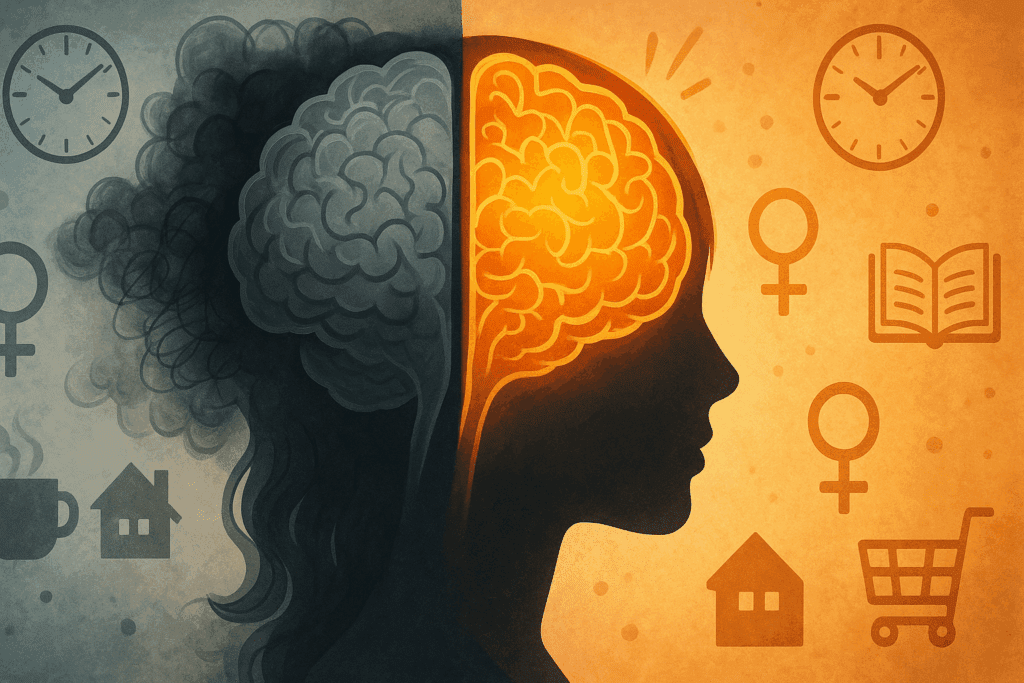
Rhodiola Rosea: A Resilience-Boosting Adaptogen for Focus and Fatigue
Among the most revered adaptogenic herbs, Rhodiola rosea is especially suited for women managing ADHD. It works by modulating cortisol levels and improving mitochondrial energy production in brain cells, which translates to enhanced focus and reduced mental fatigue. This herb is particularly valuable during times of emotional stress or hormonal transition, when energy levels and mental stamina often plummet.
What sets Rhodiola apart is its dual action: it increases the capacity for mental work while also preventing burnout. For women seeking ways to sharpen their mind and stay mentally active, especially in demanding or overstimulating environments, Rhodiola offers a sustainable path forward. Emerging research also suggests that Rhodiola may support memory retention—a benefit closely aligned with top memorization tips for studying or preparing for exams.
Bacopa Monnieri: A Cognitive Powerhouse for Long-Term Mental Clarity
Bacopa monnieri, long used in Ayurvedic medicine, is a standout nootropic herb for women with ADHD. Its primary mechanism involves enhancing communication between neurons, reducing oxidative stress in the brain, and promoting the synthesis of brain-derived neurotrophic factor (BDNF). These effects translate into improved memory recall, better concentration, and smoother information processing.
Unlike stimulant medications that can lead to jitteriness or mood swings, Bacopa provides a gentle, cumulative benefit. With regular use, it may significantly improve how to memorize things fast for exams or remember what you read while studying. Its long-term safety profile makes it especially appealing for women who want to keep their brain sharp as they age and turn their aging brain around with natural support.

Ginkgo Biloba: Enhancing Circulation and Memory in the Aging Mind
Ginkgo biloba, often celebrated for its role in cognitive aging, is another excellent herb for women with ADHD—especially those approaching menopause or in their senior years. Ginkgo enhances blood flow to the brain, delivers more oxygen and nutrients to neurons, and exerts a neuroprotective antioxidant effect. These properties are critical in maintaining cognitive vitality and reducing mental fog.
For women aiming to stay mentally sharp into their 80s and beyond, Ginkgo provides a bridge between immediate focus and long-term brain health. It also supports information recall and learning speed, making it a valuable ally when using study skills and memorization techniques. Incorporating Ginkgo into a daily wellness routine is one of the most accessible ways to sharpen your brain naturally.
Lion’s Mane Mushroom: The Nerve Regenerator for ADHD-Related Brain Fog
Lion’s Mane mushroom is gaining popularity as one of the few herbs capable of stimulating the production of nerve growth factor (NGF) in the brain. This unique feature supports neurogenesis and synaptic plasticity—two vital functions often impaired in ADHD. Women struggling with brain fog, disorganization, and a sense of cognitive stagnation often find Lion’s Mane particularly transformative.
Beyond its neuroregenerative benefits, Lion’s Mane has a calming effect on the nervous system, helping to regulate mood and promote emotional stability. These effects are especially relevant for women with ADHD who also experience anxiety or depression. Incorporating Lion’s Mane into your daily protocol can help sharpen your mind and reinforce better nerve health over time.
Gotu Kola: A Nervine Herb That Promotes Calm Focus
Gotu Kola is a traditional Ayurvedic herb often described as a nervine tonic—meaning it soothes and strengthens the nervous system. Its ability to calm mental chatter while enhancing attention span makes it an ideal herb for women dealing with ADHD and overwhelm. Unlike sedatives, Gotu Kola does not dull cognitive function; instead, it sharpens mental clarity by reducing nervous tension.
Its subtle nootropic effects also aid in memory retention and recall, aligning well with memorization tips for studying and how to memorize something in 10 minutes. When combined with mindfulness practices or breathwork, Gotu Kola can become a powerful daily ritual for staying mentally sharp and emotionally balanced.
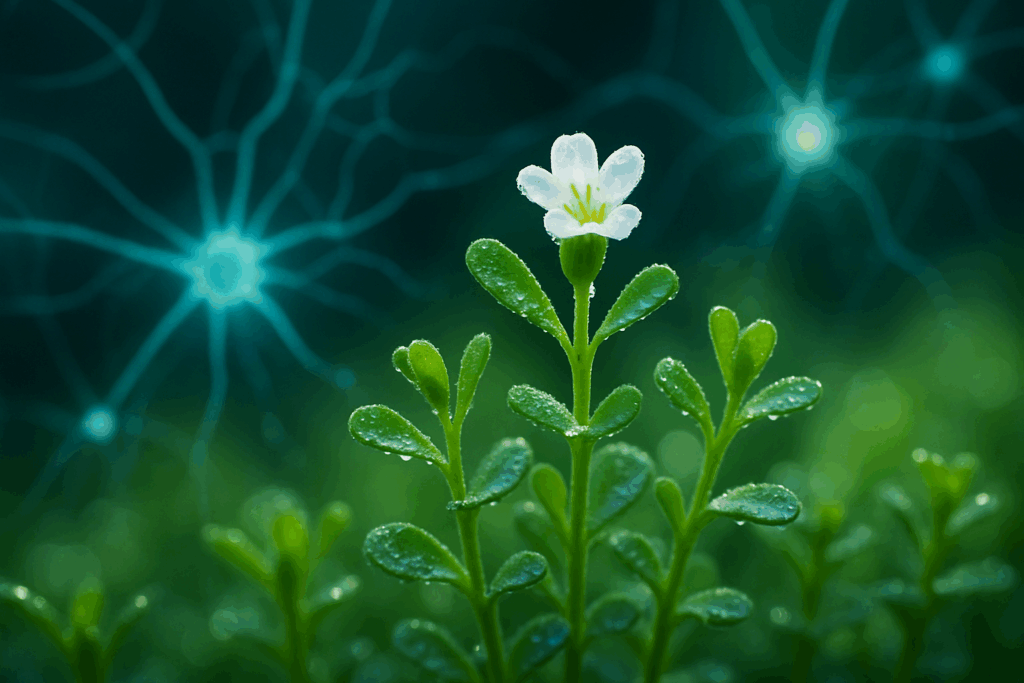
Saffron: The Mood-Brightening Herb That Supports Attention and Emotional Well-Being
Known for its mood-lifting and antidepressant properties, saffron has emerged as a promising herbal aid for ADHD. Research shows that saffron supplementation can significantly reduce ADHD symptoms, including hyperactivity and inattentiveness, particularly in women and adolescents. Its action on serotonin pathways helps stabilize mood and improve motivation—key factors in cognitive performance.
What makes saffron unique is its ability to promote emotional balance without the sedative effects of many pharmaceutical options. It encourages mental sharpness by enhancing neurotransmitter efficiency, allowing women to focus more deeply and retain information better. Saffron is especially useful when combined with memory methods for studying or as a gentle boost for emotional clarity during exams.
Holy Basil (Tulsi): Stress Relief and Hormonal Balance in One Herb
Tulsi, or Holy Basil, is a sacred herb in Ayurvedic medicine known for its powerful adaptogenic qualities. For women with ADHD, Tulsi offers a rare combination of stress resilience, cognitive support, and hormonal balance. It helps modulate cortisol levels, reduce systemic inflammation, and enhance mental clarity without overstimulation.
Tulsi’s benefits extend to improving how to keep your brain sharp, especially during times of hormonal flux such as PMS or perimenopause. By supporting the endocrine system alongside the nervous system, it provides a more holistic route to cognitive vitality. Daily use of Tulsi tea or extracts may help turn your aging mind around while also improving focus and emotional regulation.
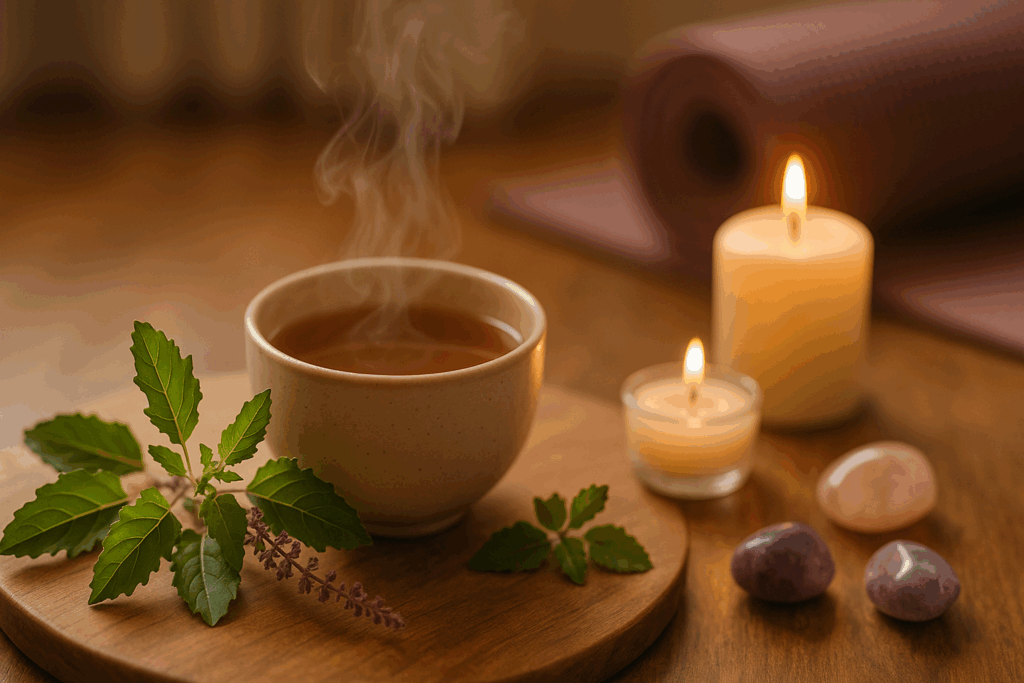
Choosing the Right Herb for You: Personalized Pathways to Cognitive Support
While all the herbs discussed offer profound cognitive and emotional benefits, the best choice depends on your individual symptoms, life stage, and wellness goals. Women dealing with fatigue and burnout may find Rhodiola most effective, while those struggling with memory lapses might lean toward Bacopa or Ginkgo. For emotional dysregulation, saffron or Holy Basil could be particularly transformative. And for those seeking to regenerate and revitalize nerve function, Lion’s Mane is an excellent ally.
It’s also important to consider potential interactions with medications and underlying health conditions. Consulting with a naturopathic doctor or integrative health practitioner ensures that your herbal choices align with your broader health strategy. Tracking your symptoms, journaling effects, and adjusting dosages gradually can also help refine your approach over time.
Supporting Brain Health Holistically: Diet, Lifestyle, and Cognitive Practices
Herbs alone cannot fully support a thriving mind. A brain-healthy lifestyle that includes anti-inflammatory nutrition, regular exercise, restorative sleep, and mindfulness practices is essential. Foods rich in omega-3s, flavonoids, and antioxidants complement the effects of herbal supplements. Equally important are cognitive strategies like study skills and memorization techniques that enhance learning capacity.
Whether you’re exploring how to memorize something overnight or looking for ways to stay mentally sharp in your 70s, combining herbs with healthy habits creates a synergistic effect. Adding practices like brain games, meditation, and digital detoxing enhances neural plasticity and cognitive resilience. In this integrative model, herbs serve not as miracle cures but as wise partners in your lifelong mental wellness journey.
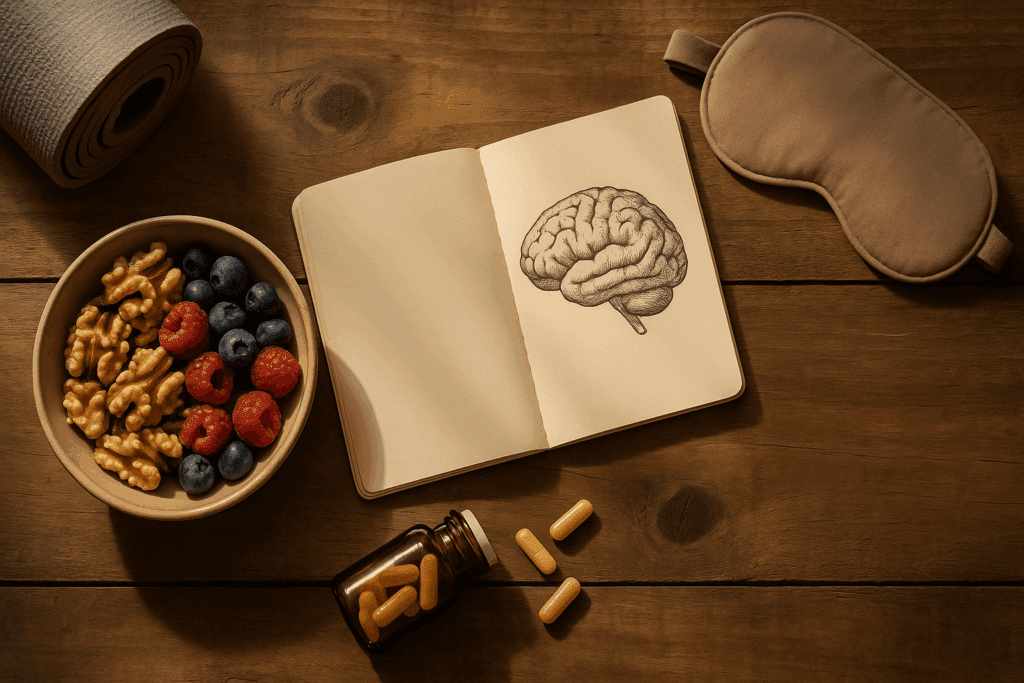
Frequently Asked Questions: Top Herbs for ADHD in Women
1. Can herbal remedies help women stay mentally sharp into their 80s and beyond?
Absolutely. Herbal remedies like Bacopa monnieri, Ginkgo biloba, and Lion’s Mane have shown potential in supporting long-term cognitive health, especially for women navigating age-related changes. These herbs don’t just enhance memory—they help maintain synaptic integrity, which is essential for those who want to stay mentally sharp into their 80s and beyond. Moreover, combining herbs with practices like reading, puzzles, or new hobbies offers sustainable ways to sharpen your mind. When paired with a nutrient-dense diet and regular physical activity, these herbs can become part of a comprehensive plan for how to keep your brain sharp as you age.
2. How do herbs support cognitive function differently for women than for men?
Women’s brains are significantly influenced by hormonal shifts throughout life—from menstruation to menopause—which affect neurotransmitter activity, stress response, and emotional processing. Herbs like Holy Basil and Rhodiola rosea interact with hormonal pathways and cortisol regulation, offering unique benefits for women. These herbs help women turn their aging mind around by providing neuroendocrine balance. Unlike conventional stimulants, which often neglect hormonal contexts, adaptogens and nervines target root causes of cognitive fatigue. That makes them invaluable tools in understanding how to keep your mind sharp as you age.
3. What are some lesser-known ways to sharpen your brain using herbal support?
In addition to daily supplementation, using herbs in teas, tinctures, or aromatherapy can provide continuous low-dose support throughout the day. For example, sipping Gotu Kola tea while journaling or meditating enhances both focus and emotional balance. Likewise, microdosing Lion’s Mane alongside breathwork may support neural regeneration over time. These rituals allow you to integrate herbal support into mindful routines, one of the most underappreciated ways to sharpen your brain. They also reflect advanced lifestyle strategies for those exploring how to sharpen your mind naturally and sustainably.
4. Can these herbs really help turn your aging brain around, or is that just a myth?
It’s not a myth, but it’s also not magic. Herbs work through cumulative, evidence-based mechanisms such as boosting BDNF (brain-derived neurotrophic factor), reducing inflammation, and supporting neurotransmitter function. For instance, Lion’s Mane is one of the few herbs that stimulate nerve growth factor, a protein directly tied to neuroplasticity. This helps rewire cognitive pathways, offering genuine potential to turn your aging brain around. When combined with mental engagement and physical activity, herbal protocols can become one of the top ways to keep your brain sharp as you age.
5. What lifestyle habits amplify the effects of herbs on focus and mental clarity?
Habits such as intermittent fasting, mindful movement like yoga, and daily brain training games can significantly amplify the benefits of herbal protocols. Intermittent fasting enhances autophagy, a cellular cleaning process that complements the neuroprotective effects of Bacopa or Ginkgo. Similarly, regular aerobic exercise increases cerebral blood flow, synergizing with herbs that support vascular function. These integrative approaches are especially powerful for women who want to know how to keep your mind sharp as you age. Pairing herbs with strategic lifestyle choices can help stay mentally sharp in your 70s and even sharpen your brain well into late adulthood.
6. How can women use herbs preventatively rather than reactively for ADHD?
The best approach is to view herbs as a proactive tool for brain health rather than a last resort. Starting early with cognitive adaptogens like Rhodiola or Tulsi builds neurological resilience before symptoms escalate. Incorporating herbs during life transitions—such as postpartum or perimenopause—can prevent cognitive dips often mistaken for mood disorders. Preventative herb use also supports how to stay mentally active through life’s natural fluctuations. Think of these botanicals as long-term allies in your goal to turn your aging mind around while staying sharp.
7. Are there any risks to using herbs to sharpen your mind long-term?
While most herbs discussed are well-tolerated, long-term use should still be guided by evidence and professional oversight. For instance, Ginkgo biloba can interact with anticoagulants, and high doses of Bacopa may cause gastrointestinal discomfort. A personalized plan created with an herbalist or integrative practitioner is best. This ensures herbs contribute to how to stay mentally sharp into your 80s and beyond without unintended side effects. Responsible use amplifies benefits while minimizing risks, helping you discover the safest ways to sharpen your mind.
8. Can herbs enhance memory techniques for studying or professional work?
Definitely. Bacopa monnieri, in particular, improves memory encoding and recall, making it a favorite for students and professionals. Combining it with techniques like spaced repetition, mnemonic devices, and visualization boosts retention even further. For women aiming to remember information quickly, integrating these practices shows how to sharpen your mind effectively. When preparing for high-stakes situations, such as presentations or exams, herbs can reduce anxiety and improve cognitive flexibility. This dual benefit enhances not only recall but also confidence and performance.
9. How do social factors affect women’s ability to stay mentally sharp in their 70s?
Social engagement plays a pivotal role in cognitive health, particularly for women who may be more affected by isolation in later years. Regular interaction stimulates multiple cognitive domains, from language processing to emotional regulation. Pairing social activities with herbs like Saffron, which supports mood and attention, can make a notable difference. Group learning environments or book clubs with herbal teas like Gotu Kola create a multi-layered approach to how to stay mentally active. These combinations offer both neurological and psychosocial ways to keep your brain sharp as you age.
10. What innovations are emerging in herbal research for aging brains?
New research is exploring synergistic blends of herbs, such as combining Lion’s Mane with curcumin or green tea catechins, to boost neuroprotective effects. Scientists are also investigating time-release herbal capsules that provide sustained benefits throughout the day. This could redefine how to sharpen your brain with precision and personalization. Additionally, wearable tech paired with cognitive herbs may one day monitor brainwave patterns and deliver adaptive dosing recommendations. These developments are pushing the boundaries of how to keep your brain sharp and how to turn your aging brain around with scientific insight.
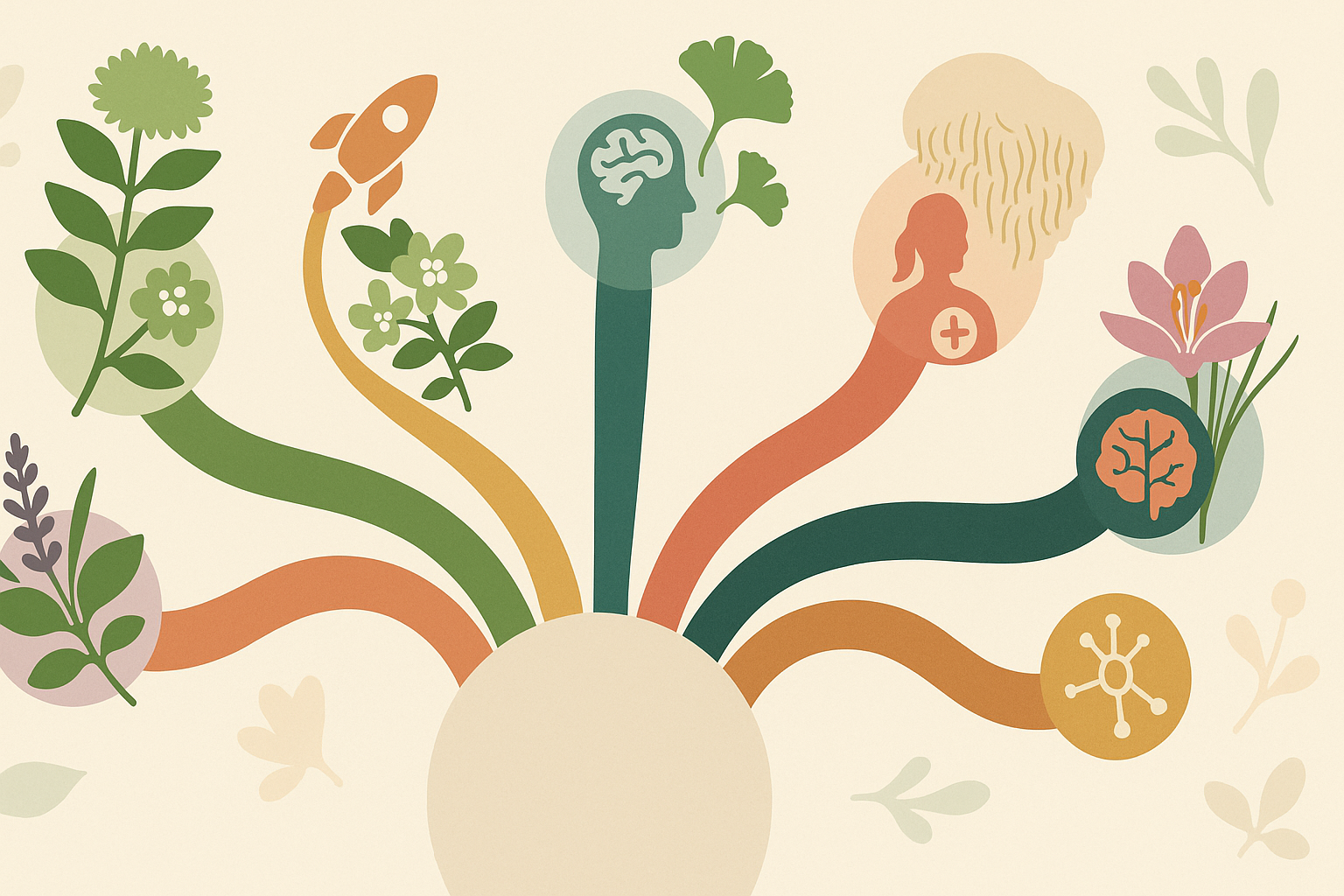
Conclusion: Empowering Women to Sharpen Their Minds Naturally
As our understanding of ADHD in women continues to evolve, so too does the range of empowering, natural tools available for cognitive support. The top herbs for ADHD in women offer nuanced, multi-dimensional benefits that extend far beyond symptom management. They help sharpen your mind, enhance emotional balance, and support how to stay mentally active into your 80s and beyond.
Whether you’re seeking how to memorize things fast for exams, exploring ways to keep your brain sharp as you age, or navigating ADHD with a natural touch, these herbs can be your allies. By integrating evidence-based botanicals with smart lifestyle strategies, you can reclaim mental clarity and create a brain that thrives at every stage of life. And as you discover the herb that resonates with your unique mind and body, you’ll not only sharpen your brain—you’ll also nourish your sense of self and resilience.
Further Reading:
6 simple steps to keep your mind sharp at any age


